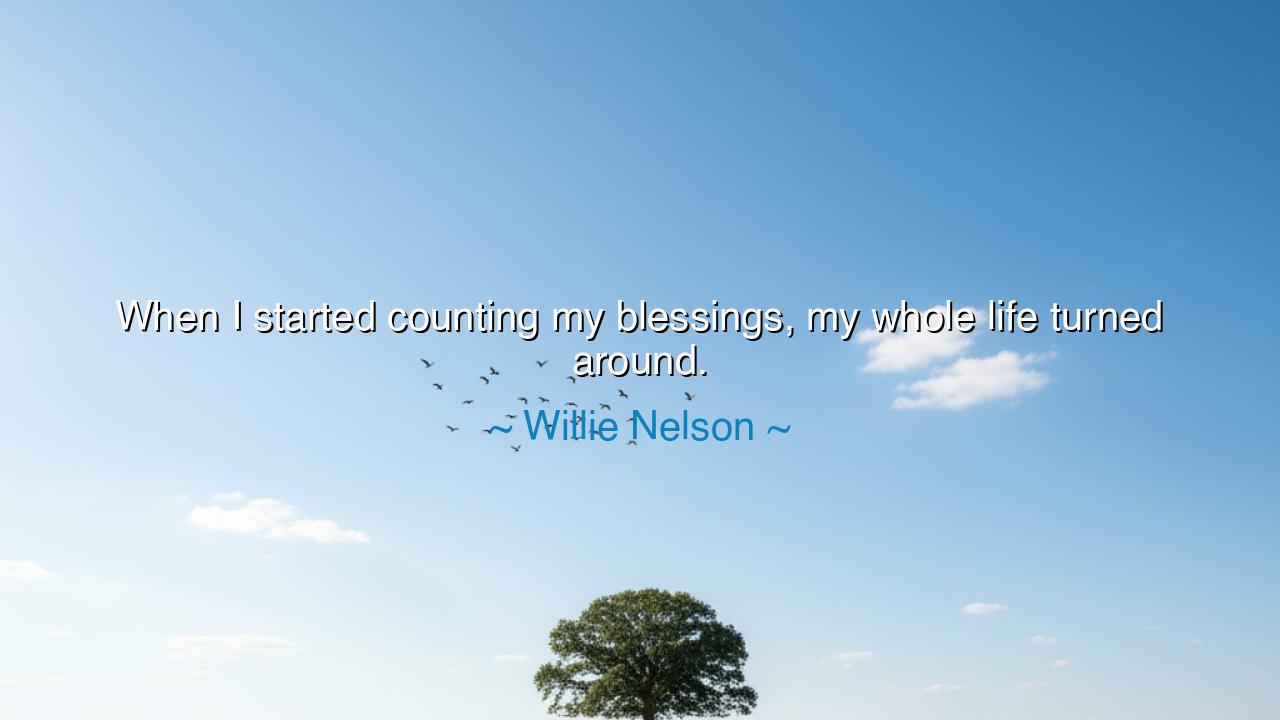
When I started counting my blessings, my whole life turned






"When I started counting my blessings, my whole life turned around." These words from Willie Nelson offer a profound insight into the transformative power of gratitude. In this simple yet deeply powerful statement, Nelson reveals the key to unlocking a richer, more fulfilling life—shifting our focus from what we lack to what we have. Gratitude, Nelson suggests, is not just an abstract concept or a fleeting feeling; it is a force that can reshape our entire perspective on life. By counting our blessings, we begin to see the abundance around us, and in doing so, we open ourselves to a world of possibility and joy. This act of conscious appreciation turns the ordinary into the extraordinary, filling our lives with meaning and purpose.
The ancient Greeks understood the transformative power of gratitude. Aristotle taught that the pursuit of happiness was tied to virtue, and gratitude was central to this. In his work, Nicomachean Ethics, Aristotle argued that happiness arises not from external wealth or fame, but from the cultivation of inner virtues, including gratitude. He saw gratitude as the basis of virtuous living, a way to live in harmony with the world around us. Aristotle’s teachings suggest that gratitude is a moral compass, guiding us toward the right actions and helping us to live in alignment with our highest values. The act of counting our blessings, as Nelson describes, reflects this ancient wisdom—it is the beginning of a life led by virtue and inner peace.
In the Buddhist tradition, the practice of gratitude is an essential part of cultivating a mindful and peaceful life. Buddha himself emphasized that true contentment comes not from the pursuit of external possessions or achievements, but from an internal shift—seeing the world through the lens of thankfulness and appreciation. The practice of mindful gratitude involves reflecting on the gifts we have, both large and small, and cultivating an inner peace that arises from recognizing the impermanence and interconnectedness of all things. Gratitude, in this sense, is a way of letting go of attachment to what we do not have and embracing what is already present in our lives. By doing so, we move closer to enlightenment, living in a state of balance and acceptance.
The historical figure of Mahatma Gandhi serves as a powerful example of the transformative power of gratitude. Despite enduring immense hardship—exile, personal loss, and the struggles of leading a nation toward independence—Gandhi maintained a deep sense of thankfulness for the opportunities that life presented. He often spoke of his gratitude for the support of his followers and the strength he drew from his own beliefs. Gandhi’s ability to remain grateful in the face of adversity helped him to focus on the greater good rather than the obstacles before him. His life was a testament to the idea that when we choose to count our blessings, even in the hardest times, our lives can transform into something greater than we imagined. His example shows that gratitude is not simply a reaction to good fortune, but a mindset that empowers us to face challenges with strength and resolve.
Nelson’s quote also resonates with the life of Viktor Frankl, a psychiatrist and Holocaust survivor, who wrote about the importance of finding meaning in life even in the direst of circumstances. In his book Man's Search for Meaning, Frankl discusses how the attitude one adopts in the face of suffering can make all the difference. He describes how even in the concentration camps, he found moments of gratitude—for the human connections he made, for the strength to endure, and for the inner peace that arose from his spiritual convictions. Frankl’s work shows that by shifting our focus toward what we can appreciate, rather than fixating on what is lacking, we can find meaning even in the most tragic and desperate situations.
The lesson in Nelson’s words is simple yet profound: the act of counting our blessings is a powerful tool for transforming our lives. By consciously focusing on the positive, we not only shift our perspective, but we also change the way we interact with the world. It is easy to become overwhelmed by the challenges we face, but when we take the time to appreciate what we have, we move from a mindset of lack to one of abundance. This shift opens up a new world of possibility, allowing us to see opportunities where we once saw obstacles, and to find joy in even the smallest moments.
In our own lives, we must cultivate the practice of gratitude every day. Let us take a moment each day to reflect on the blessings we have, whether they be in our relationships, our health, or the simple joys of life. In doing so, we will find that the more we appreciate, the more life will open up to us. Gratitude is a choice, and by choosing it, we can transform our lives in ways we never thought possible. Just as Willie Nelson found his life turning around when he chose to count his blessings, so too can we find peace, purpose, and fulfillment by embracing the transformative power of thankfulness. Let us all, in the spirit of the ancients, count our blessings, knowing that through this simple act, we can find our way to a life of meaning and joy.






AAdministratorAdministrator
Welcome, honored guests. Please leave a comment, we will respond soon